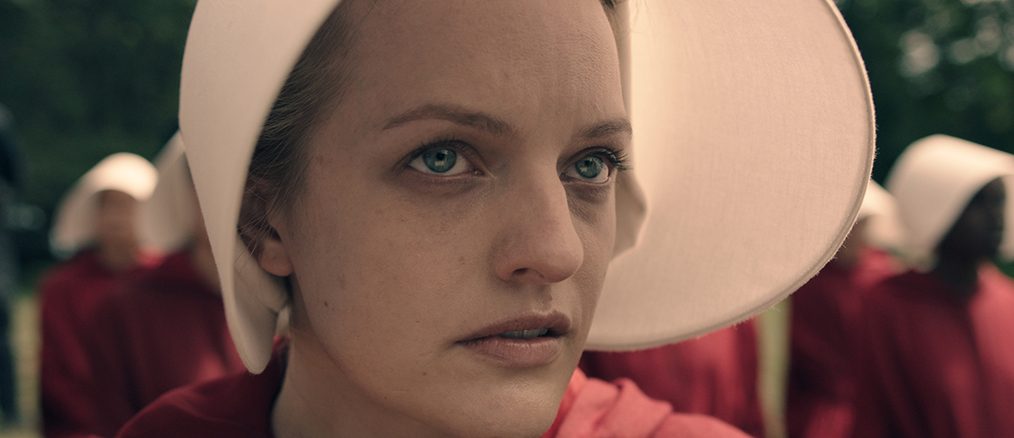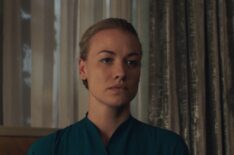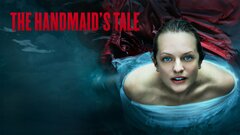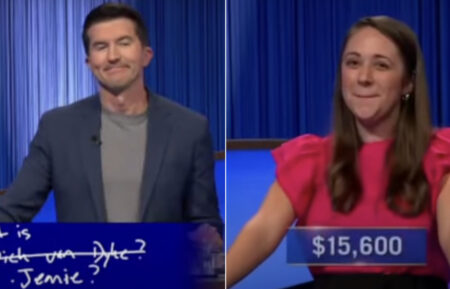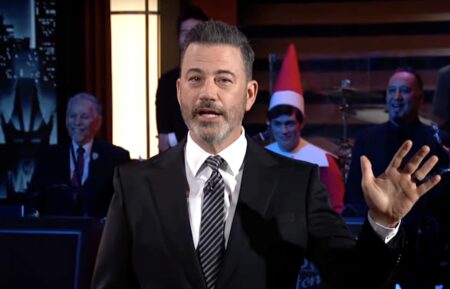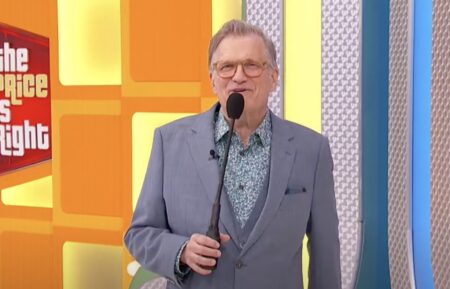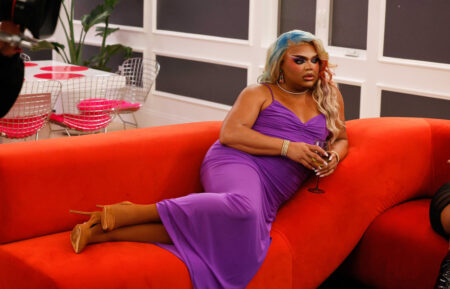O-T Fagbenle Is Your New Crush on ‘The Handmaid’s Tale’
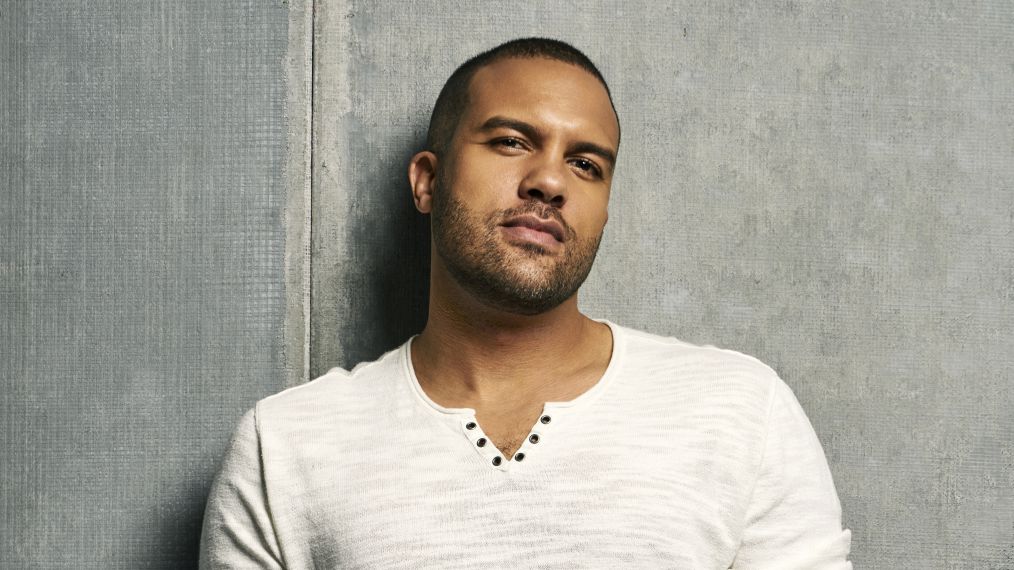
It seems almost perverse to be crushing on any of the men on The Handmaid’s Tale, but even the grim state-sanctioned misogyny of Hulu’s harrowing dystopian series is no match for O-T Fagbenle’s charms.
The 36-year-old British actor plays Luke, Offred’s (née June) husband from before the rise of the Gilead regime and one of the show’s few woke baes. So far, our only exposure to our new man crush has been via flashbacks, but at the end of Episode 6, we get explicit confirmation along with Offred (Elisabeth Moss) that Luke survived his run-in with the soldiers who captured her and their young daughter.
Spoilers ahead…
Wednesday’s episode is yet another major departure from the book, following Luke on his journey to Canada after his family is split apart. TVInsider spoke with Fagbenle last week about the ways that his character’s plotline changes the original story, and why there is only “Team Luke.”
Were you familiar with the book?
Not at all. I got the audition, and it looked like it was gonna go my way, and so I thought, “I better read this book!” And I read it, and I just fell in love with it. I just thought, “This is extraordinary. How have I not heard or read it before? What dark cave have I been living in?” From there I was just sold.
How far into the casting process did you learn that Luke’s story wouldn’t just be confined to flashbacks?
I knew pretty early on that we’d find out that Luke is alive. We’d get to see a lot more of him, and that was definitely something which encouraged me to be part of the team, to know that we’d get to see more of the world outside of Gilead. Which, as a fan of the book, I was so excited to see more of.
Did you and Bruce Miller talk about how Luke’s survival changes the story?
How do you mean?
His storyline really broadens the scope of the series, but it also changes the story significantly. The book is very insular.
We didn’t, although I was always cognizant of the ways that the tone of lots of the series, like you said, is very insulated, very subtle and very subtextual, because the world of Gilead is more Victorian than the Victorians were in terms of their social constraints. And in Episode 7 you just get a blast of in-your-face action in some ways. A man being chased by an extraordinarily powerful foe and kind of all-encompassing system.
So I have my own concerns—because I’m such a fan of the [story] as it was—I had my own concerns that we’d be able to keep a through line between those two kind of dynamics. And what was said to me by Bruce and [director Florio Sigismondi] and the other makers of the show was just how actually that contrast actually helps to give you context. And there’s something really wonderful about giving fans of the show a completely different flavor to throw into the mix.
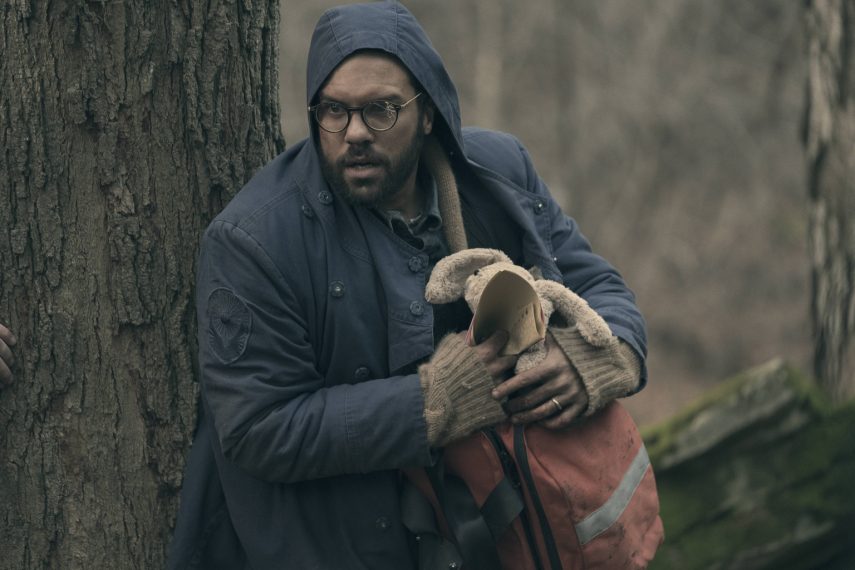
Luke (Fagbenle) escapes after June (Elisabeth Moss) is captured.
This might not be a fair question, but is this an indication of where the series could go in subsequent seasons?
Listen, it’s a totally fair question, and the answer is, I have no idea! [Laughs] I’m not privy to the inner workings. It’s above my pay grade. They’re such smart individuals who figure out that kind of important stuff. I, certainly as a fan, am excited to see more of the broader world. As you say, the book is so insular. The story of the book—spoiler alert—at the end we get that bigger picture, that historical perspective on what happened. It’s enthralling and infuriating and exciting, and I want the series to answer some of the millions of questions I have around the book, as a fan of the book.
So how secretive were Bruce and the writers about plot developments. Did they just give you the script for the episode you were working on and leave you in the dark about what else was coming?
Oftentimes you work with writers and producers who are very cagey about things. People don’t want you, for various reasons, to get attached to future storylines because things change all the time. But in this instance, Bruce in particular is so collaborative and so generous with his fellow artists that I always felt included in the conversations. He’s the captain of the ship, and he’s a great captain, so I was genuinely happy to be onboard.
Have you had any conversations with Margaret Atwood about the changes to your character?
You know, Margaret—Ms. Atwood—has been at a couple of the events that I have, and we have met and talked. But unfortunately for me, you know, some people get starstruck by movie stars. I get starstruck by people like Margaret Atwood. I become a bit of a fanboy around her. So, to my own dismay, I’ve not managed to have a really in-depth conversation about much. It’s just me trying to put syllables in front of each other.
A few of her other novels are being developed for TV. Are you excited about those?
Yeah, I can’t wait. I think she’s a very important writer. I just love her work.
So, the fact that Offred knows, more or less, that Luke is alive also really complicates her affair with Nick. Do you think we’re going to run into a Team Luke v. Team Nick thing?
Listen, I want you and all the readers to know, there’s one team, and it’s Team Luke.
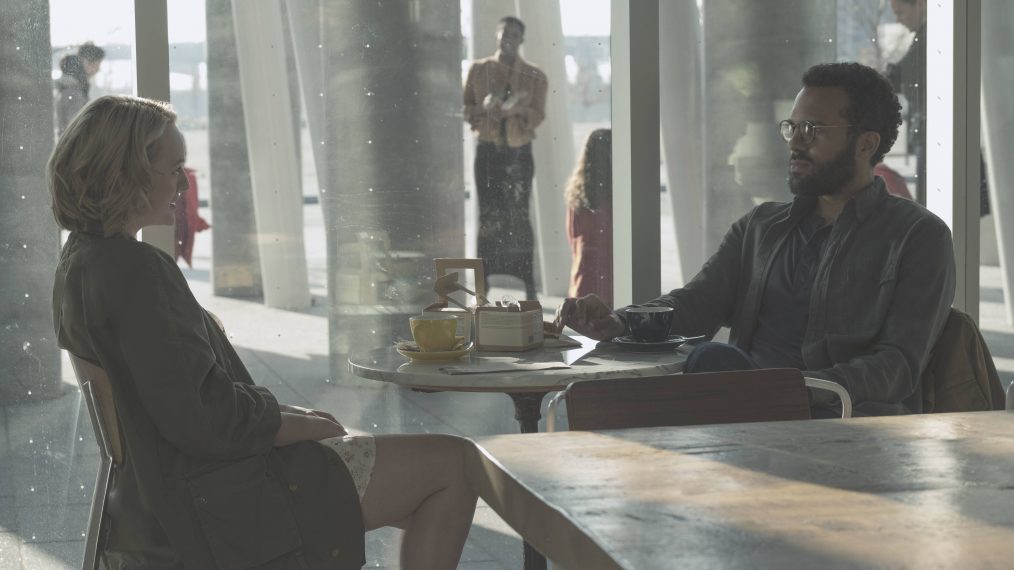
June (Moss) and Luke (Fagbenle) share a moment early in their relationship.
In the book, Offred thinks that there’s part of Luke that isn’t as uncomfortable with the initial restrictions on her freedom as he should be. Do you think that’s something your version of the character confronted?
You know, it’s hard for all of us to own up to our privileges. I’m a relatively young man who lives in the quote-unquote “developed” world. There are so many privileges [compared with] most of the people in the world. We’re all so proud of the hard work we put in. It’s very hard to really recognize how many ways, systematically, we have advantages over other people. I don’t think Luke is immune to that. It’s very hard, I think, for us to come to terms with that. But Luke is more conscious than most and does what he can to educate himself. But as you can see in some of his scenes, there’s work to be done.
It would have been interesting seeing him wrestle with that more explicitly in the show. Where is the line for him, you know?
Absolutely. It’s an interesting question for all of us: How much are we willing to tolerate injustice towards other people when it makes our lives more uncomfortable? I was reading an article about Brené Brown talking about acts of courage, choosing between what is right and what is comfortable. It’s a question that plays into all of our lives. In the lead-up to Gilead, all men face that question.
Do you have a sense of what it means to Luke to be one of the few decent men in this world?
I think it’s easy to think on the macro level, as an outsider. I think for most people, they’re much more concerned with their small circle. I think his biggest concern is being a good husband and being a good father and looking after his family. That lack of broader vision is probably why he wasn’t more engaged in broader political movements to stop it. And because of that he’s faced with a much bigger foe, because he decided to act too late.
One of the most striking things about the series has been the use of pop songs. As a musician yourself, what do you make of some of those choices?
Well to be honest, I’ve…what can I say about that? I’m just a fan of this show and I’m a fan of the creators of this show, so I just love it! I love the dichotomy there between what we connect to now in pop music and this other world. I think it helps us on some kind of visceral level connect ourselves to quite a weird dystopian future. We have some kind of sense memory of these songs, and having those resonate while we’re kind of engaged in this hyper-nationalistic world creates a fantastic counterbalance or dichotomy. I don’t know exactly what the word is, but it creates this friction, which I think is great.
What do you listen to to help you get into character?
It’s less getting into character, but more certain moods. I listen to certain songs which might get me in a certain mood.
Is that what you think Luke listens to?
This is going to sound a bit weird, but I don’t always have this clear distinction between me and the characters I play. I feel like…I have all those characters in me. I can only actually act or think something which is in my head. It has to at some point be in my own imagination, my self. So my job is to turn certain parts of me up and certain parts of me down or to use certain experiences that I’ve had as a metaphor for other experiences in a script.
Is this a star-making role for you?
Listen, I’m not going to fight with anyone who gets into that kind of conversation! [Laughs] I’m getting to do what I love and getting paid for it and that’s like the greatest joy of my working life. I’m not waiting on anything more.
So it’s nice if people say this is a star-making role. But it kind of assumes that becoming a star is something that’s a big desire, some goal to be reached. I’m overjoyed to be part of this show. I’m so happy with that, to work with people like Elisabeth Moss and Bruce Miller and [executive producer] Reed Morano. It’s such a privilege to me. I’ve been blessed in my life to do what I love for a living, but to be honest I felt the same when I was doing community theater in East London for £280 a week.
The Handmaid’s Tale, Wednesdays, Hulu

